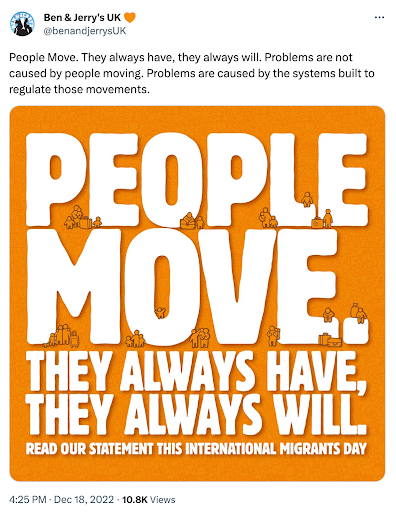Marketing in the Age of Polemics: Has Cancel Culture Changed Lead Acquisition for Brands?
We’re living in a polarised age defined by sentiments like ‘go woke, go broke’, and ‘cancel culture.’ For brands in an era of political tribalism, has lead generation been impacted by an increasingly divisive marketing landscape?
The marketing landscape today is suffering from a problem that it contributed to. Hyper-targeted social media marketing has helped users reaffirm their beliefs with content created with engagement as a priority–rather than fact, fiction, or even legally sound statements.
These stark divisions have even permeated available marketing insight. According to a recent Ipsos Consumer Tracker survey, 58% of shoppers believe that corporations should remain neutral when it comes to political issues, with 52% suggesting the same for social issues.
At the same time, 48% of consumers claim that they are less likely to buy from a company with opposing political views, with 52% echoing this sentiment for social issues.
However, Harris Poll research has found that as much as 82% of consumers want a brand’s values to align with their own, and have expressed a greater desire to buy products from brands that share their values.
So, what does this mean for lead acquisition and your future branding strategy? While some brands have been wise to remain consciously apolitical, others have fully nailed their colors to their mast and embraced some of society’s modern polemics.
Whether you’re buying your hot drinks from the vocally “anti-hipster” Black Rifle Coffee, or looking for love on OKCupid’s app designed for “every single tree hugger,” it appears that political partisanship can now pick a tribe for every view.
While such bold moves are undoubtedly the result of extensive target audience research and the construction of a compliant customer profile, can embracing the tribalism of social media really be sustainable in lead generation for brands? Let’s take a deeper look at how polemics are changing marketing:
Selling to Social Tribes
Digital marketing has become sophisticated to the point where social media user interests, likes, dislikes, political affiliations, education levels, and a vast range of other demographics can be used to shape the content and ads that appear on their newsfeed.
This can amplify the type of content that users become exposed to, turning both progressive and conservative views into cues for more extreme content.
In the same way that liking a viral post about kittens can bring more animal and nature content to your newsfeed, engaging in posts relating to climate change, civil rights, religion, or various political orientations can open the door to more affirmative content while contrasting views are filtered.
This echo chamber has led to a new age of tribalism. One example of this can be found in Pew Research Center data which suggests that 90% of Republican voters who get their political news from a single conservative platform believed that the US controlled the COVID-19 outbreak as much as possible, while less than 50% of other Republicans that rely on at least one other major news provider shared the same sentiment.
Social tribes can also amplify consumer beliefs to the extent that they’re willing to outright reject opposing views. One Civic Science study found that 61% of US respondents have unfriended, unfollowed, or blocked someone on social media because of their politically charged posts.
Although this risks social media users becoming increasingly isolated from balanced perspectives, it’s provided brands with an opportunity to save more money in directly targeting their ‘tribe’ to generate more quality leads.

(Image Source: Black Rifle Coffee)
In the case of the Black Rifle Coffee example, we can see the company appealing to its tribe by adopting more conservative associated values, such as nationalism and the right to bear arms.
In accepting these values as the brand’s own, businesses can fine-tune their audience segments and increase value for money in pay-per-click (PPC) advertising.
Go Woke, Go Broke?
The flip side of these more targeted campaigns is the risk of losing the custom of those who oppose these divisive views. The term ‘go woke, go broke’ recurs throughout social media for companies that are viewed with disdain by those opposed to a new marketing campaign that shares a sentiment that isn’t supported within their social media echo chamber.
One of the most notable cases of this was when Bud Light launched its US advertising campaign featuring transgender influencer Dylan Mulvaney, in a move that sparked a passionate backlash from conservatives.

(Image Source: Instagram: Dylan Mulvaney)
With support for LGBTQ+ causes associated strongly with liberal social media tribes, the opposing conservative tribe sought to publicly declare that they would boycott Bud Light.
Google Trends data shows that searches for Bud Light rocketed off the back of the April 1st video, but these higher impressions have failed to result in more sales movements for the Anheuser-Busch-owned product.
Data suggests that US sales at Anheuser-Busch fell more than 10% over three months ending June 2023 in comparison to 2022 figures. While the company’s core profit in the US is down some 28%.
So aggressive was the backlash against Bud Light’s campaign that musician KidRock took to Instagram to post a video of himself shooting at a table of Bud Light beer.
“Clearly, consumers have had it with corporate America trying to push values down on the people they supposedly are serving,” claimed Will Hind, executive director at Consumers’ Research. “People now act fairly swiftly when they see companies going ‘woke’ in ways that are noxious.”
The reason for Bud Light’s marketing struggles is down to a failure to resonate with their target audience. For a brand that has a target audience of men aged between 21 and 34 who are interested in sports, humor, and socializing, it’s inevitable that their demographic will feature conservatives as well as liberals.
Other campaigns have shown that ‘go woke, go broke’, could be better adapted to an umbrella term such as ‘forget your target audience, forget about sales’, which can be applied to both liberal and conservative company values.
When ice cream brand Ben & Jerry’s took aim at the UK government’s plans to ramp up its immigration laws, the firm took to Twitter to declare that “people cannot be illegal.”

(Image Source: Twitter: Ben & Jerry’s)
Despite some social media users threatening to boycott Ben & Jerry’s over its more liberal pro-migration stance, the brand has continued to use its UK social channels to support the cause consistently.
With Ben & Jerry’s annual revenue reaching $450 million in 2022, it appears that the brand has championed values that are closer to the hearts of its audience without suffering from a backlash from one tribe or another. Some industry experts have even championed the brand’s irreverent stance on the values it supports.
“Ben & Jerry’s has grown into the environment we find ourselves in today. The brand hasn’t changed, but the environment we’re all living in has come to meet it,” said Jon Goldstone, global managing partner of The Brandgym “A lot of the stuff it did early on was incredibly prescient – almost like they had a magic ball they were looking into and could predict the future.”
Navigating Cancel Culture
While ‘go woke, go broke’ is a derisory term given to brands seeking to embrace liberal values within their marketing materials, the threat of ‘cancellation’ follows brands that showcase more conservative values within their marketing.
Cancel culture is viewed by its supporters as a tool for capturing social justice, and as such, business representatives have the ability to negatively impact public opinion surrounding their brand in a single Tweet or Instagram post.
When Robert Unanue, CEO of US Hispanic-owned food company Goya, expressed his support for Donald Trump at an event in 2020 by claiming “We’re all truly blessed at the same time to have a leader like President Trump, who is a builder,” the hashtag #BoycottGoya quickly turned viral across social media platforms.
Such is the power of boycotting brands with associated conservative links or those offering direct financial support to former President Trump in the US that websites such as DoneGood offer curated lists of companies with ties to avoid.
However, in the case of Goya’s boycott, the calls to stop buying from the food firm backfired. Despite social media calls to boycott Goya outnumbering positive posts about Goya products by 75%, net sales of Goya products actually jumped 22% in the two weeks following the controversy.
So, given that both ‘going woke’ and ‘getting canceled’ can be ineffective in the cases of Ben & Jerry’s and Goya, could there be value in brands avoiding the fence and diving into social media polemics? The answer isn’t a straightforward one.
Small Margins for Error in an Activist Society
Pointing to the University of Southern California Annenberg Center for Public Relations’ 2020 Global Communication Report, Stefan Pollack, president of PR agency The Pollack Group and Forbes author, claims that “the days of being apolitical are gone. As a matter of fact, the act of staying apolitical is, in effect, political.”
“Among many findings, the report reveals the identity of ‘the new activist’ who is far more influential than activists have ever been before — as well as more informed, more tech-savvy, more passionate and more extreme than we have ever seen,” Pollack notes. “These new activists are driven by distrust in political institutions and may soon be more influential than CEOs and journalists.”
With this in mind, it’s clear that cancel culture can drive positive change for brands, but the economic impact of their actions will rely heavily on a number of factors–some of which aren’t in the control of marketing teams.
Fundamentally, participating in political conversation, and taking sides on a divisive topic can run the risk of damage to your reputation and credibility, even if you believe that you’re on the right side of the discussion.
When makeup brand L’Oreal announced its support for the #BlackLivesMatter movement in 2020, the firm faced calls of hypocrisy after dropping model Munroe Bergdorf in September 2017 for echoing what some followers believed was a similar sentiment on Instagram.
But as Pollack highlights, apolitical stances can be interpreted as political in the age of social media tribalism.
When Uber failed to take a meaningful stance against President Trump’s infamous travel ban in 2017 and instead offered cheaper rides to JFK airport at a time when other taxi drivers in New York were protesting, the inactivity on the subject led to Uber’s CEO, Travis Kalanick stepping down from Trump’s economic advisory council.
Uber’s inactivity saw many users delete their apps as #DeleteUber began trending on Twitter. Eventually, Uber chose to act and set up a $3 million legal defense fund for its immigrant drivers.
Lead Acquisition Built on Comprehensive Research
Fundamentally, we’ve seen repeatedly that there’s no room to get your stance on a polarising subject wrong when it comes to marketing.
Although the risks are high, some businesses–and particularly those that are linked to polarising topics–can’t afford to sit on the fence and show inactivity when action can bring greater levels of public support.
With this in mind, coming out in support of political issues can be a great way of winning an appeal with new customers and solidifying your bonds with your target audience, who may be more likely to align your brand based entirely on your political views.
However, this approach to marketing campaigns can only be successfully completed if you know your customer profile comprehensively, and have full confidence that your target audience will align their values alongside yours.
Before launching a campaign that could be considered divisive, be sure to consider some key factors. Firstly, is the campaign being undertaken with authenticity and diligence? Or have you misinterpreted a circumstance that could cause a negative reaction to your stance?
Secondly, it’s imperative that you are as transparent as possible throughout your campaign. If you face scrutiny, this transparency will keep you protected against factors that may undermine your stance.
Finally, if the topic aligns strongly with your brand values, broadcast your message across multiple platforms so that it becomes your brand voice.
We may be in the age of ‘go woke, go broke’ and cancel culture, but this doesn’t mean there’s a right or wrong way to market your brand to a politically motivated audience. In a circumstance where you’re fully aware of the cause, your relationship with the topic, its impact on your target audience, and the polemics it can prompt, you may be able to build a constructive campaign among customers who identify with your values.
If we’re in the age of ‘forget your target audience, forget about sales’, your brand can transcend political tribalism to resonate with your customers through a well-researched and transparent campaign.









